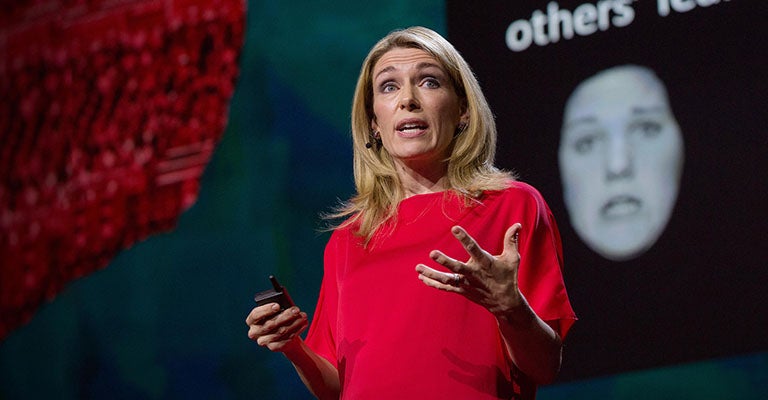Marsh Honored for Altruism Research

Psychology professor Abigail Marsh, shown here delivering a TED Talk on her research into altruism, has received an award, secured a grant, and published a book this fall. (Photo: Marla Aufmuth/TED)
October 26, 2017 — Many academics stumble across their specialty in a college classroom or postgraduate lab. That wasn’t the case for Abigail Marsh.
When the Georgetown College psychology professor was 20, a stranger crossed four lanes of highway traffic on foot to get her out of harm’s way after she was involved in a car accident. From that point on, Marsh couldn’t shake her fascination with the psychological basis for behavior like this. What quirk of the human brain could make someone decide to risk their life for a stranger?
“It’s sort of a puzzle from a biological perspective — when people help family, friends, other people that they’re close to, you can explain that very well through principles of self-interest,” Marsh said. “But what about giving a stranger your kidney? That seemed like a big mystery.”
While she spent much of her career studying psychopathy — “the other end of the spectrum,” as she puts it — Marsh eventually turned toward answering that nagging question of altruism. This fall marks several milestones in her journey.
Last month, she received a grant from the National Science Foundation to continue her research into the neurological basis of altruistic behavior. Earlier this month, she published a book, The Fear Factor: How One Emotion Connects Altruists, Psychopaths and Everyone In-Between. Finally, her research program earned her the S&R Foundation’s Kuno Award for Applied Science in the Social Good.
THE EMPATHY SPECTRUM
The Fear Factor, which has been critically well-received thus far, is a deep dive into the differences between the brains of psychopaths, altruists, and “ordinary” people, based on years of Marsh’s research.
The book works off the prevailing belief in modern psychology that most behaviors traditionally thought of as “disorders” are better understood as high- or low-end examples of a behavioral spectrum present in all humans.
“It’s not that there’s a hard and fast cutoff between being anxious and having an anxiety disorder — there’s a gradient,” Marsh said. “The same is true for empathy and compassion.”
Marsh shows that some of the difference in behavior can be observed by using brain imaging to measure the structure and function of the amygdala, an area of the brain associated with emotion, decision-making and memory.
“People who are extremely altruistic have amygdalae that look basically like the opposite of a psychopath’s,” Marsh said. “They’re larger than average, more reactive than average, and help the person be better able to recognize and empathize with fear.”
A NEW INTERVENTION
Marsh’s team will continue researching altruism with the help of a grant from the National Science Foundation it received last month.
Their most recent findings have revealed that the connections between the amygdala and the periaqueductal gray (PAG) — a region of gray matter involved in pain and stress regulation — may support caring responses in altruists.
Marsh’s team hypothesizes that the brain’s parental care system, of which pathways between the amygdala and PAG are part, has been adapted in altruists to support caring responses to all people, not just children or other family members.
“The same systems are on overdrive in altruists, and they’re active when presented with a situation in which they can help somebody,” Marsh said.
The three-year, $390,000 NSF grant will continue funding for a project in which Marsh’s team performs brain scans on people who have donated kidneys to strangers. The newest experiment involves performing a meditation-based intervention on “ordinary” people — those who aren’t unusually altruistic — that will attempt to make them respond more like altruists do.
“We’re going to leverage their capacity to care for people close to them and try to make it apply to people who are more distant,” Marsh said.
Marsh and her team will perform brain scans on the “ordinary” subjects while they are presented with a task involving their willingness to help various others. They hope to determine whether the subjects from the meditation protocol are more willing to help even people they aren’t close to.
ENRICHING SOCIETY
Earlier this month, Marsh’s work was recognized by the S&R Foundation, a nonprofit dedicated to supporting artists and scientists whose work supports charitable causes that enrich society.
Marsh won the 2017 Kuno Award, a $100,000 grant awarded to a scientist whose research goes toward solving a 21st-century problem.
“I am honored and thrilled to have been selected as this year’s recipient of the Kuno Award,” Marsh said. “With its support, my students and I will be able to work toward a more complete understanding of human altruism and to develop better methods for fostering it.”